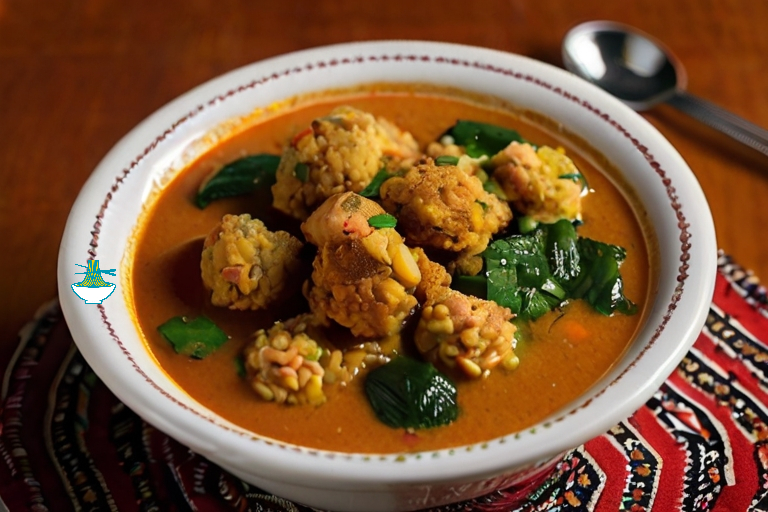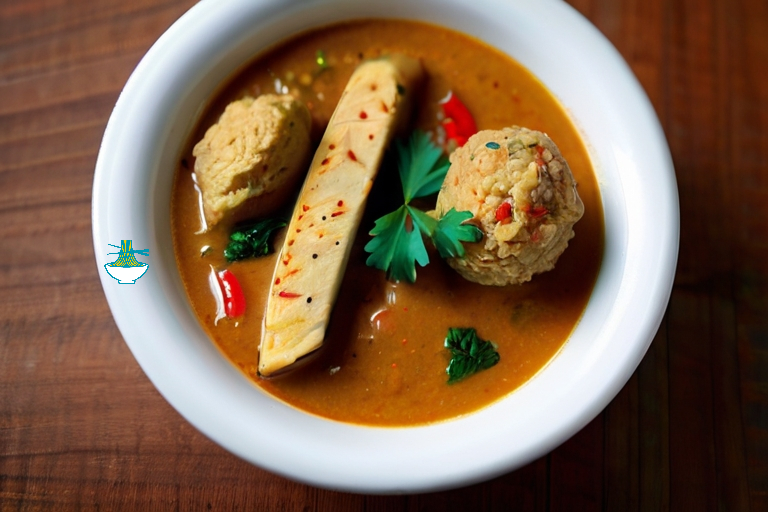Welcome to the rich culinary traditions of Cameroon, where hearty soups hold a special place in the hearts and homes of its people. Among the myriad of delightful dishes, Cameroon Egusi Soup stands out as a true emblem of Cameroonian gastronomy. This savory and aromatic soup is a beloved staple, cherished for its flavorsome blend of ingredients and its ability to bring families and friends together around the dining table.
Originating from the West African region, Egusi Soup is a popular dish across many countries, each with its own unique variations. In Cameroon, this soup is prepared with a distinctive twist, incorporating a delightful array of local spices and ingredients that reflect the country's diverse culinary heritage.
In this recipe, we will guide you through the process of creating an authentic Cameroon Egusi Soup that captures the essence of traditional Cameroonian cooking. From selecting the freshest ingredients to mastering the art of simmering and seasoning, you'll embark on a culinary journey that celebrates the rich flavors and cultural tapestry of Cameroon. So, roll up your sleeves, sharpen your knives, and get ready to savor the delightful flavors of Cameroon Egusi Soup!
Ingredients:
- 1 cup Egusi (ground melon seeds)
- 2 cups assorted vegetables (such as spinach, bitterleaf, or pumpkin leaves), chopped
- 1 onion, finely chopped
- 2 tomatoes, diced
- 2 cloves garlic, minced
- 1 inch ginger, grated
- 2 tablespoons palm oil
- 1 pound meat or fish (chicken, beef, goat meat, or fish fillets), cut into bite-sized pieces
- 1 tablespoon ground crayfish
- 1 teaspoon ground dried shrimp (optional)
- 1 teaspoon ground pepper (hot or mild, according to preference)
- Salt to taste
- 4 cups water or broth

Instructions:
1- Prepare the Egusi: Heat a dry skillet over medium heat and toast the Egusi seeds, stirring frequently, until they turn golden brown and release a nutty aroma. Remove from heat and allow to cool. Once cooled, grind the toasted Egusi seeds into a fine powder using a blender or food processor. Set aside.
2- Sauté the Aromatics: In a large pot or Dutch oven, heat the palm oil over medium heat. Add the chopped onion, minced garlic, and grated ginger. Sauté until the onions are translucent and fragrant, about 3-5 minutes.
3- Brown the Meat or Fish: Add the meat or fish pieces to the pot and cook until browned on all sides, about 5-7 minutes.
4- Add the Tomatoes and Spices: Stir in the diced tomatoes, ground crayfish, dried shrimp (if using), ground pepper, and salt to taste. Cook until the tomatoes are softened and the spices are fragrant, about 5 minutes.
5- Incorporate the Egusi: Gradually add the ground Egusi to the pot, stirring constantly to prevent lumps from forming. Continue to cook for another 3-5 minutes, allowing the Egusi to absorb the flavors of the other ingredients.
6- Simmer the Soup: Pour in the water or broth, stirring to combine. Bring the soup to a gentle simmer, then reduce the heat to low. Cover and let it simmer for about 20-30 minutes, or until the meat or fish is tender and cooked through.
7- Add the Vegetables: Stir in the chopped vegetables and cook for an additional 5-10 minutes, or until the vegetables are tender but still vibrant green.
8- Adjust Seasoning: Taste the soup and adjust the seasoning with salt and pepper if needed.
9- Serve Hot: Once the soup is ready, ladle it into bowls and serve hot with your favorite accompaniments such as boiled rice, fufu, or crusty bread. Enjoy the rich and comforting flavors of Cameroon Egusi Soup!
Note: Feel free to customize this recipe by adding your favorite vegetables or protein options. Additionally, you can adjust the thickness of the soup by adding more or less water or broth according to your preference.
Nutritional Values:
Here are the approximate nutritional values for the ingredients used in the Cameroon Egusi Soup recipe per serving:
1 cup Egusi (ground melon seeds):
- Calories: 600
- Fat: 45g
- Carbohydrates: 30g
- Fiber: 15g
- Protein: 30g
benefits: Rich in protein, healthy fats, vitamins, and minerals such as magnesium, zinc, and calcium. Provides essential nutrients for muscle growth, energy production, and bone health.
2 cups assorted vegetables (spinach, bitterleaf, pumpkin leaves):
- Calories: 50
- Fat: 0.5g
- Carbohydrates: 10g
- Fiber: 5g
- Protein: 5g
benefits: High in fiber, vitamins (such as vitamin A, vitamin C, and vitamin K), and antioxidants. Supports digestive health, strengthens the immune system, and promotes overall well-being.
1 onion:
- Calories: 40
- Fat: 0g
- Carbohydrates: 10g
- Fiber: 2g
- Protein: 1g
benefits: Contains antioxidants and sulfur compounds that have anti-inflammatory and anti-bacterial properties. Supports heart health, boosts immune function, and aids in regulating blood sugar levels.
2 tomatoes:
- Calories: 30
- Fat: 0.5g
- Carbohydrates: 7g
- Fiber: 2g
- Protein: 1g
benefits: Excellent source of vitamin C, potassium, and lycopene, a powerful antioxidant. Supports cardiovascular health, helps protect against certain types of cancer, and promotes healthy skin.
2 cloves garlic:
- Calories: 10
- Fat: 0g
- Carbohydrates: 2g
- Fiber: 0g
- Protein: 0g
benefits: Known for its medicinal properties, garlic contains sulfur compounds that have antibacterial, antiviral, and immune-boosting effects. Supports heart health, reduces blood pressure, and may help lower cholesterol levels.
1 inch ginger:
- Calories: 5
- Fat: 0g
- Carbohydrates: 1g
- Fiber: 0g
- Protein: 0g
benefits: Has anti-inflammatory and antioxidant properties, thanks to its bioactive compound gingerol. Helps alleviate nausea, aids digestion, and may reduce muscle pain and soreness.
2 tablespoons palm oil:
- Calories: 240
- Fat: 28g
- Carbohydrates: 0g
- Fiber: 0g
- Protein: 0g
benefits: Contains antioxidants, vitamin E, and healthy fats. Supports brain health, improves cholesterol levels, and provides energy.
1 pound meat or fish (chicken, beef, goat meat, or fish fillets):
- Nutritional values vary depending on the type of meat or fish used. Here's an approximate for chicken breast:
- Calories: 430
- Fat: 10g
- Carbohydrates: 0g
- Fiber: 0g
- Protein: 80g
benefits: Rich in protein, essential amino acids, vitamins (such as B vitamins and vitamin D), and minerals (such as iron and zinc). Supports muscle growth and repair, provides energy, and contributes to overall health.
1 tablespoon ground crayfish:
- Calories: 20
- Fat: 1g
- Carbohydrates: 0g
- Fiber: 0g
- Protein: 3g
benefits: Good source of protein and essential minerals like calcium and iron. Adds flavor to dishes and provides essential nutrients for muscle and bone health.
1 teaspoon ground dried shrimp:
- Calories: 10
- Fat: 0g
- Carbohydrates: 1g
- Fiber: 0g
- Protein: 2g
benefits: Contains protein, omega-3 fatty acids, and minerals like calcium and phosphorus. Adds a savory flavor to dishes and provides essential nutrients for overall health.
1 teaspoon ground pepper:
- Calories: 5
- Fat: 0g
- Carbohydrates: 1g
- Fiber: 0g
- Protein: 0g
benefits: Contains capsaicin, a compound with anti-inflammatory and metabolism-boosting properties. Adds heat and flavor to dishes, and may help improve digestion and promote weight loss.
Salt:
- Nutritional values vary depending on the type and amount used.
benefits: Essential for maintaining fluid balance, nerve function, and muscle contraction. However, moderation is key as excessive salt intake can lead to high blood pressure and other health issues.
4 cups water or broth:
- Calories: 0
- Fat: 0g
- Carbohydrates: 0g
- Fiber: 0g
- Protein: 0g
benefits: Hydrates the body, supports digestion, and helps transport nutrients and oxygen to cells. Essential for overall health and well-being.
Note: These values are approximate and can vary based on factors such as cooking methods and specific ingredients used.


Comments